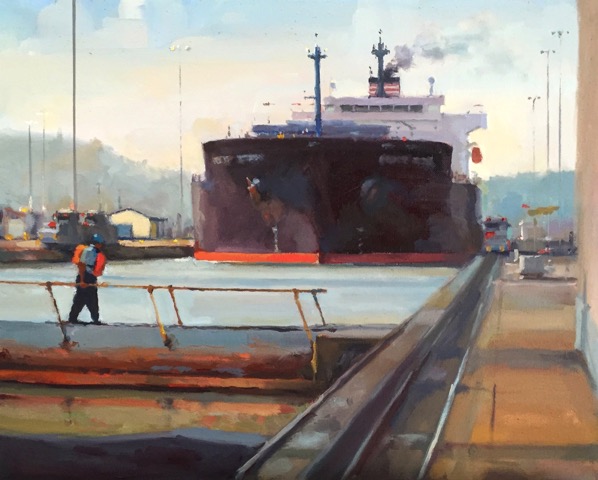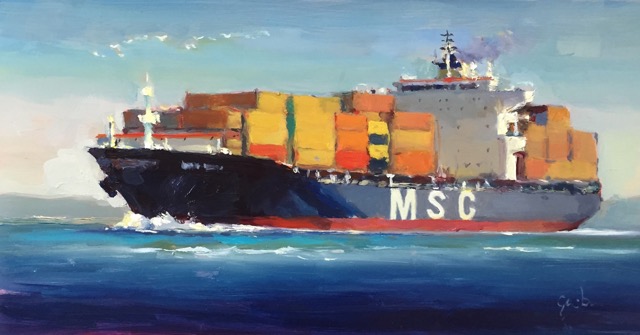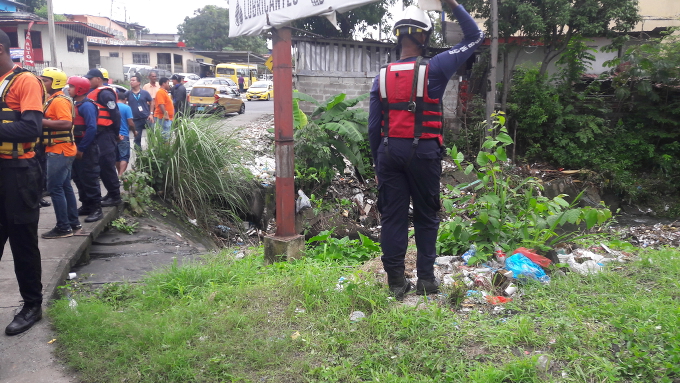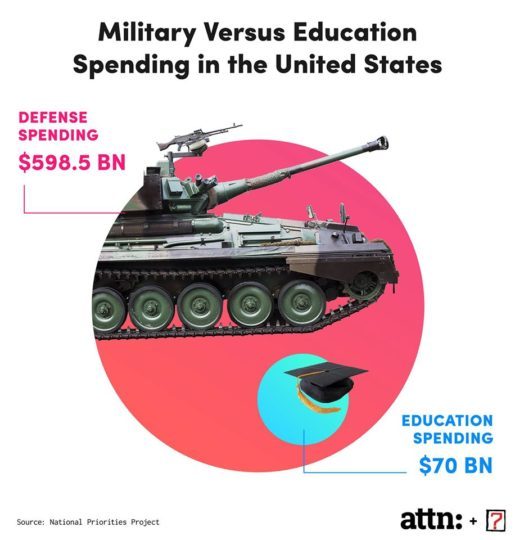
Paintings and website makeovers by George Scribner



The artist’s new online store
The artist’s new blog
~ ~ ~
These announcements are interactive. Click on them for more information.




The banking superintendent warns
and we should read more into it
by Eric Jackson
On September 9 Panama’s Superintendency of Banks issued a warning about an apparent Ponzi scheme with several names, perhaps the most common Flor de la Abundancia. but also El Telar de Mujeres and other names. The terse one-page announcement noted complaints in other countries and advised that this operation has no permit from the superintendency to collect money in Panama. There were no details about who is or was running this outfit here or any physical address or contact data — let alone whether there was any link to a corporate entity and if so any data on that or the lawyers who organized such a corporation. Nor were potential victims warned of places where the scheme is promoted online. In keeping with norms not only of the banking superintendency and the securities markets superintendency here, but also their counterparts across the region, there was also nothing about anybody having been arrested or being sought by police.
The custom in Panama has been for police, prosecutors and regulatory agencies to look at frauds committed against foreigners — by persons or entities within or outside of Panama, against persons inside or outside of Panama — as laughing matters rather than criminal cases. Here the warning has gone out because Panamanians, particularly Panamanian women, are the targets.
This particular pyramid scheme is different from most in that it’s a cyclical operation designed to spin off new organizations, which are apt to take on different names and have different people — or apparently different people — at their center. That form of organization has given the scheme more longevity than the usual pyramid, in which ever more new people are drawn in to put in money that pays earlier “investors” and especially the original promoters, until the day come when their is a deficit of suckers and the scheme collapses of its own weight with the promoter long gone. This particular scheme was first identified in Barcelona a decade ago, has swept across and up and down Latin America and has been late arriving in Panama, or at least its search for victims has come here late.
(Russian mob families, members of the Spanish royal family, shady real estate developers and other denizens of the financial crimes underworld have long made the Barcelona area one of their preferred habitats. Some of these have been known to launder money in Panama or to use international money laundering shell games designed by Panamanian law firms. Until recent years it seems that the Russians would launder money here but would not directly participate in the Panamanian rackets. Now, however, they are players in the local prostitution and human smuggling scenes.)
In any case, in its sweeps around Latin America this particular scheme prompted public disturbances in Colombia in 2008. There in the southern town of Buesaco a personero believed to be in league with swindlers he was supposed to be investigating was shot and killed.
About a year ago the scheme appeared in Mexico and since then it has been exposed on a CNN website and in the magazine El Economista. The headlines have not included the arrest of any the operation’s major figures. The typical pitch is that one puts $100 into the scheme and gets $800 out of it, so it would seem to be a no-brainer for one or more law enforcement agencies to pony up a hundred bucks and try to follow that money. The apparent regional law enforcement consensus is that to be taken for a c-note makes you a pendejo rather than a citizen who ought to be protected.
The art has advanced since the days of Charles Ponzi, when there was no Internet. There are standard old themes like affinity pitches — in this case to women with a bit of money to lose but few real prospects of ever getting rich. There is the old standby of pseudo-religion, with Bible passages and yoga terminology and symbolism invoked here along with the abundant life buzz words of the Prosperity Gospel pitch. But this swindle also uses YouTube (see the video above) and Facebook, and naysayers are apt to face various sorts of online bullying.
Beware, of course. But maybe there should also be some concern about roles that range from apathetic to enabling on the parts of some powerful public and private institutions.

Adults get swept into storm drains and drown as Panama gets into the heaviest months of rains. More frequently those who die are kids. You should understand that you are puny compared to an elemental force, and that raging flood waters can gather in an instant during or just after a tropical cloudburst. A small child won’t. It takes a nation of caring adults to save kids’ lives in this season.
Splash 24/7, PanCanal says it won’t be drawn into a price war with Suez
GCaptain, World’s largest ro-ro ship transits the expanded canal
Washington Post, That pricey Arctic cruise was just the beginning
MarineLink, Cruise ship transits the Northeast Passage
Bloomberg, Arctic shipping still a dream
Splash 24/7, Hanjin Shipping edges closer to oblivion
Metro Libre, Taekwondistas panameños sacaron su casta en Costa Rica
SoundersFC.com, CONCACAF World Cup qualifying tournament schedule
BBC, Brazilian police want to question IOC head
La Estrella, Comercio en la Zona Libre se desploma 36% en cuatro años
BBC, Denmark to buy leaked Panama Papers data
Blades, ¿Ahora se puede comprar lo hurtado impunemente?
Reuters, Spanish ex-minister linked to Panama Papers renounces World Bank job
ANP, El objetivo del préstamo por $300M que el Banco Mundial otorgó a Panamá
Página 12, El FMI vuelve con pedidos de ajuste
Barrios, La geopolítica del crimen organizado y la economía del crimen
Eyes on Trade, TPP is unfortunately not dead
The Intercept, Obama promises lame duck TPP push
Bloomberg: Clinton’s Drug proposals ‘very negative,’ Pfizer CEO says
CSO, Ransomware prevalent in cloud-based malware
Espinosa & Molina, The climate’s low-hanging fruit
Slate, Giraffes are four species rather than the one previously thought
Australian National University, New material to revolutionize water proofing
Mashable, Ticos go two months without burning fossil fuels for electricity
Mongabay, Dam foes say Ecuador criminalizes them
La Estrella: Barro Blanco, un conflicto extendido por todo el país
TVN, Piden bajar niveles de intolerancia por discusión de la educación sexual
InSight Crime, Arrest of Panama drug boss shows gangs’ international ambitions
Ukraine Today, Ukrainian ex-official detained by Panama court for 40 days
El Tiempo, Mizrachi intentó evitar su recaptura
The Independent, What Donald Trump has really been up to in Latin America
EFE, 72% de colombianos votará “sí” en plebiscito sobre paz
CEPR, Have US-funded CARSI programs reduced crime in Central America?
WOLA, Private prisons: a questionable model across the Americas
E&N, Nicaragua otorga asilo al expresidente Mauricio Funes
Real Clear Politics, Latest US polls
McCann, Malheur Part I: Sovereign Feelings
McCann, Malheur part II: Ours But Not Ours
Russell, Two wars for the American West
The Economist, Post-truth politics
Wallace-Wells, The facts and falsehoods of the Clinton Foundation
Taibbi, The unconquerable Trump
Valenti, Schlafly won some battles but lost the war
Green, Dilma’s impeachment and Brazil’s future
Burges, Temer’s presidential dilemma in Brazil
Blades, Brasil y el desgaste de la politiqueria
Fortune, Why Facebook removing a Vietnam War photo is so important
Tegría, Indigenous peoples demand protection of sacred sites
Caribbean News Now!, Black Uhuru’s Duckie Simpson
 La muralla de la paz
La muralla de la pazHay murallas que se construyen para la paz.
Esa es la muralla de Nicolás Guillén (1902-1989), poeta cubano, quien cantó para que todas las manos se juntaran y evitaran la guerra. Su plegaria pretendía unir a los pueblos del mundo. La muralla ha sido grabada por el grupo chileno Quilapayún, así como los españoles Ana Belén y Víctor Manuel. Son muchas las murallas que por mala fortuna han sido levantadas para la guerra. Así es la muralla que pretende construir Trump para separar los pueblos que viven a orillas del río Grande, entre México y EEUU.
Según Trump la muralla que se construiría entre EEUU y Mexico tendría una extensión de 1.600 kilómetros y un costo de 8.000 millones de dólares. El especulador norteamericano asegura que esa cantidad es una “cantidad muy pequeña comparada con el dinero que EEUU pierde con México”.
Trump asegura que México pagará la construcción de la muralla si gana las elecciones en noviembre. Según un diario de la capital mexicana, “como es habitual en las promesas electorales del candidato a la Casa Blanca, los números no encajan y a veces son mentiras”. A pesar de las amenazas de Trump contra los empresarios norteamericanos que inviertan en México, muchos no le hacen caso a su proyecto de muralla. La segunda empresa de automóviles de EEUU, la Ford Co., anunció que va a invertir 1.600 millones de dólares en una nueva fábrica en la localidad mexicana de San Luis Potosí, que dará empleo a 2,800 personas, casi todas mexicanas.
Como es habitual en las promesas electorales del candidato a la Casa Blanca, los números no encajan, y algunos de ellos son mentiras. Las grandes multinacionales de EEUU no le están haciendo mucho caso.
El gobierno mexicano pagaría la muralla, según Trump, en tres pasos. El “primer día” en la Casa Blanca, el magnate exigirá que los “extranjeros” que residan en EEUU presenten pruebas de su residencia legal para realizar transferencias de dinero fuera del país.
El “segundo día” de su presidencia, asegura Trump, México elevaría una protesta diplomática por la medida anunciada. “En el tercer día” de su presidencia, Trump exigirá al Gobierno mexicano que pague una cantidad indeterminada de miles de millones de dólares para construir el muro. Si no lo hace, Trump le prohibiría a los mexicanos indocumentados transferir fondos a sus familias. Los asesores de Trump dicen que los mexicanos en EEUU envían a su país 24.000 millones de dólares anuales en remesas. El monto “actúa como una red de protección social en México”.
De antemano, Trump anuncia la guerra. Hay una masa electoral en EEUU que apoya la guerra. Por esta razón hay mucho miedo en el mundo.
Los pueblos latinoamericanos luchan por la paz. El pueblo norteamericano también. Pero hay ‘alacranes y ciempiés’ que quieren tomarse el poder político (entre ellos candidatos como Donald Trump o golpistas más al sur) para separar los pueblos y hacer la guerra.
A diferencia de los guerreristas como Trump, los latinoamericanos sabrán abrirle la muralla ‘al corazón del amigo’. También hay ‘rosas y claveles’ a las cuales la muralla les abrirá paso.
Lean más abajo La muralla de Nicolás Guillén, adaptada a Trump:
Para hacer esta muralla / tráiganme todas las manos / Los negros, sus manos negras,
los blancos, sus blancas manos.
Ay,
una muralla que vaya… desde la playa hasta el monte / desde el monte hasta la playa, bien / allá sobre el horizonte.
¡Tun, tun! / ¿Quién es? / Una rosa y un clavel… / ¡Abre la muralla!
¡Tun, tun! / ¿Quién es? / El sable de Trump… ¡Cierra la muralla!
¡Tun, tun! / ¿Quién es? / La paloma y el laurel… ¡Abre la muralla!
¡Tun, tun! / ¿Quién es? / El alacrán y el ciempiés de Trump…/ ¡Cierra la muralla!
Al corazón del amigo, abre la muralla / al veneno y puñal de Trump, cierra la muralla;
Al mirto y yerbabuena, abre la muralla / a la serpiente de Trump, cierra la muralla;
Al ruiseñor en la flor, abre la muralla…
Alcemos una muralla, juntando todas las manos; los negros, sus manos negras,
Los blancos, sus blancas manos.
Una muralla que vaya/ desde la playa hasta el monte /desde el monte hasta la playa, bien / allá sobre el horizonte…

The US presidential race
Americans go to the polls on or before November 8 and whether it’s Hillary Clinton or Donald Trump who is proclaimed the winner on the evening of the first Tuesday after the first Monday of the 11th month largely depends on how many Americans show up at the polls and who they are. Predictions are less than a dime a dozen, the pollsters and pundits have been wrong all through the primary season, there are wild cards of ethnic passions out there and there will be hundreds of thousands of people improperly disenfranchised by vote suppression tactics ranging from discriminatory state laws to outright fraud. Americans living abroad have a right to vote, generally by absentee ballot in the place where they last lived in the USA, and would be wise to exercise this right. In many countries consequences ranging from changes in consular services to anti-American riots may ultimately flow from how we decide.
The polls have Donald Trump and Hillary Clinton within the margin of error of one another, Libertarian Gary Johnson at a bit more than eight percent and the Greens’ Jill Stein with about three percent. It’s going to be Clinton or Trump, but the third party protest votes may matter a great deal. A total Johnson collapse could put Trump in the White House. So could intra-Democratic faction fighting that drives some of the party’s left half to stay home or cast protest votes for Stein.
It has been and will be an ugly negative campaign. The candidate who between now and November rises above identity politics and hot button hatreds to offer the nation a compelling vision of where it should go these next four years ought to win. Or should we say, the viable candidate who does that may find the key to victory, even to greatness. There is precedent for this. In 1932 the aristocratic Franklin D. Roosevelt rode into office on a wave of revulsion and desperation after the Roaring 20s financial swindles collapsed and threw millions of innocent people into penury. The campaign visionaries were on the fringes. Roosevelt played it safe and then stole much of the Socialist Party platform and enacted it into law as part of the New Deal. Trump could do something like that, stealing Gary Johnson’s platform or David Duke’s. Once in office Hillary Clinton might pay attention to the neoconservatives, to the democratic socialists who were nearly half of this year’s Democratic primary electorate or to some of Jill Stein’s ideas.
Look for a huge gender gap in favor of Clinton, not only because she’s a woman but because Trump’s a creep. Look for the true enormity of irrationalism and white supremacy to assert itself in the Trump column. And listen for the voices of Latino communities that have always been a part of the US political landscape having their say, perhaps decisively this time.
The next phase in Panamanian law enforcement
Five police officers, mostly of higher ranks and including a commissioner and a subcommissioner, are under arrest. We had a weekend of police checkpoints along the roads, in which cops were not checking driver driver’s licenses or auto registrations but looking for other cops to arrest. By various accounts at least three more top law enforcement officials who have not been arrested are under investigation. The prison sentence for weapons offenses of former police chief and national security director Gustavo Pérez — who threatened a police coup against Ricardo Martinelli in the event of civilian review of police actions — has been upheld. With a generous raise in retirement benefits thrown in as a sweetener the bloated top ranks of the nation’s law enforcement apparatus are being substantially thinned. Martinelli had moved to put those whom he figured were loyal in key police positions, and now Juan Carlos Varela is clearing the way for a new generation of law enforcement leadership.
Mentioned in the rhetoric and lurking in the background of every part of this story is gangland infiltration of Panama, its police forces, its politics, its business sectors and its population. The War on Drugs is lost, but even once we recognize that and move on to more humane and effective ways to fight addiction, the gangsterism that all sides of it brought to our society will remain a problem. Let’s end the big money temptations that the drug underworld can wave in the faces of our police officers, prosecutors, judges and elected officials. Let’s get rid of the bad cops and promote the good ones, whatever the momentary opportunity for corruption. And let’s be honest and forthright people who deserve honest and forthright policing.
Bear in mind…
I claim not to have controlled events, but confess plainly that events have controlled me.
Abraham Lincoln
From time to time, there have reappeared certain indications of racism directed against specific groups in Panamanian society, due to ethnic or racial considerations. Fortunately there has always existed a group of Panamanians who have been ready to take a categorical stand in opposition to every form of racial discrimination and to demonstrate their tireless and constant decision to eliminate these plagues that attempt to deny certain people their human rights.
George Westerman
The most common way people give up their power is by thinking they don’t have any.
Alice Walker

Last December the Supreme Court issued an order for Ricardo Martinelli’s arrest on illegal wiretapping charges. Between the high court and the foreign ministry, that warrant has bounced around in the Panamanian government and has never been passed on to INTERPOL, nor to authorities in the United States to whence Martinelli fled. The revelations of Edward Snowden and the 1904 US-Panamanian extradition treaty make an extradition on that charge politically and legally problematic but most of the other more than a dozen pending charges against the former president are for more garden variety graft and peculation. But proceedings on those charges are at a standstill in the Supreme Court and now that body’s presiding magistrate, Martinelli appointee José Ayú Prado, says that he wants to investigate the court investigators’ poor performance. That, of course, would cause further delays.
Panamanian law is in many ways designed to promote political corruption, and one of these ways is with primitive to nonexistent tolling statutes. Somebody with the money to hire armies of lawyers can interpose motion after motion and delay after delay in hopes of running out the calendar on the statute of limitations. Better yet, she or he could rely on cooperative judges or prosecutors to do a lot of that work. There is no law that says that while someone who has fled is out of the country, the clock stops as far as statutes of limitations go. For the most part the time taken up by delays caused by the accused is similarly not subtracted from the time limit to bring and finish a case.
Already, most of the cases of vote buying with public funds by Martinelli-backed candidates for the National Assembly in the 2014 elections are on the verge of being extinguished by the calendar. That the Martinelli-appointed Electoral Prosecutor Eduardo Peñaloza has from the day he took office taken dives on enforcing the law against his boss’s minion — and that seems to be fine with Attorney General Kenia Porcell. But a prosecutor’s bad faith refusal to uphold the law does not toll the statute of limitations. There have been convictions for perhaps the most egregious of the vote buyers, Heriberto “Yunito” Vega and his running mate in a campaign for a seat in the legislature from the province of Herrera. That his opponent was President Varela’s brother (to whom he lost) was apparently less of a factor than the crude, in-everyone’s-face fashion in which public funds were transferred from the national government through local governments, then through Vega’s maid and ultimately into gifts for the voters. This case, which got the two candidates three-year prison sentences, was the exception.
Ricardo Martinelli, who is harbored by the US government, can probably wait out any legal consequences for what he did in comfortable Miami self-exile. Panama is too obscure to most Americans for the matter to become a US campaign issue. But also stalled is Martinelli’s bid for a political comeback.
Sixteen of the Cambio Democratico party’s 25 deputies now refuse to take Martinelli’s orders. He designated former labor minister Alma Cortés as acting president and gave her orders to purge the 16 rebels. But she has been busy with other things, like defending herself from criminal charges that she somehow obtained about $3.5 million while in public office and which she can’t explain as coming from a legitimate source. After some time in preventive detention she was granted $300,000 bail, but could not immediately raise it. As in, the very wealthy Ricardo Martinelli has not been nearly so loyal to his dwindling band of followers as he expects members of his party to be to him. Cortés is out now but does not appear to be functioning in the role that she held before she went to jail. CD secretary general Rómulo Roux is now the party leadership’s public face and he says that the party’s legislative caucus is 25 members rather than nine.
Cambio Democratico announced in July that it would start to gather petition signatures to call for a new constitutional convention. Others are also talking about that. The CD petition drive is just talk, and no longer much of that lately. The hard reality is that by themselves the party couldn’t come close to mobilizing the people needed to collect the needed more than a half-million petition signatures.
And Martinelli’s next campaign? He says he wants to run for mayor of Panama City in 2019. It’s early yet, but there are no indications of any popular demand for that.
In his absence from Panama Martinelli’s public statements have been less about any big political plans and more about promoting the media empire that he acquired while president, largely financing those purchases via lucrative government advertising. That gravy train stopped running when Martinelli’s term in office ended. The shrunken page size of El Panama America and far thinner La Critica attest to the Martinelli brand’s woes. For the past year or so the former president has been warning that Varela wants to shut down the EPASA newspapers, NexTV, KW Continente radio and so on, but it seems that the market is what’s moving in that direction. The Martinelli family’s billboard business also seems to be a major bust if one considers who owns most of those signs that now just say that they are for rent.
Does the bipolar politician who ran for president on the platform of “Los Locos Somos Más” have the reputation of a manic raver? We may now be seeing the other end of the pole, a political and business career sputtering out in a depressive haze.

On Monday, the UK government agreed to an amendment to the Finance Bill that would enable the UK tax authority, HMRC, to publish country by country financial reports of UK-headquartered multinational corporations. Country by country reports show basic information about a multinational’s operations, including taxes paid, number of employees, revenue generated, and profits on a country-level. These reports can give light to abuse of tax laws and aggressive tax avoidance.
Porter McConnell, Director of the Financial Transparency Coalition, issued the following statement:
This step by the UK is certainly welcome, but it’s important that the government actually uses the power it now has by releasing country by country reports of UK multinationals to the public as quickly as possible. Last week, we saw outrage regarding Apple’s tax scheme in Ireland. Before that, there was outrage around secret tax deals arranged between Luxembourg and hundreds of corporations from around the globe. It’s time to break out of perpetual scandal mode and make some changes to business as usual. A financial system that relies on plausible deniability and shifting responsibility is inherently shaky, and it’s simply not sustainable.
But UK-headquartered corporations only represent a small portion of the global economy. This move should be a catalyst for other governments, a number of whom supported the idea of public country by country reporting in May’s Anti-Corruption Summit held in London. Members of the European Union will debate making country by country reports public in the coming months. To put the world economy back on sounder footing, more countries will need to join the UK and take up this common sense public reporting.